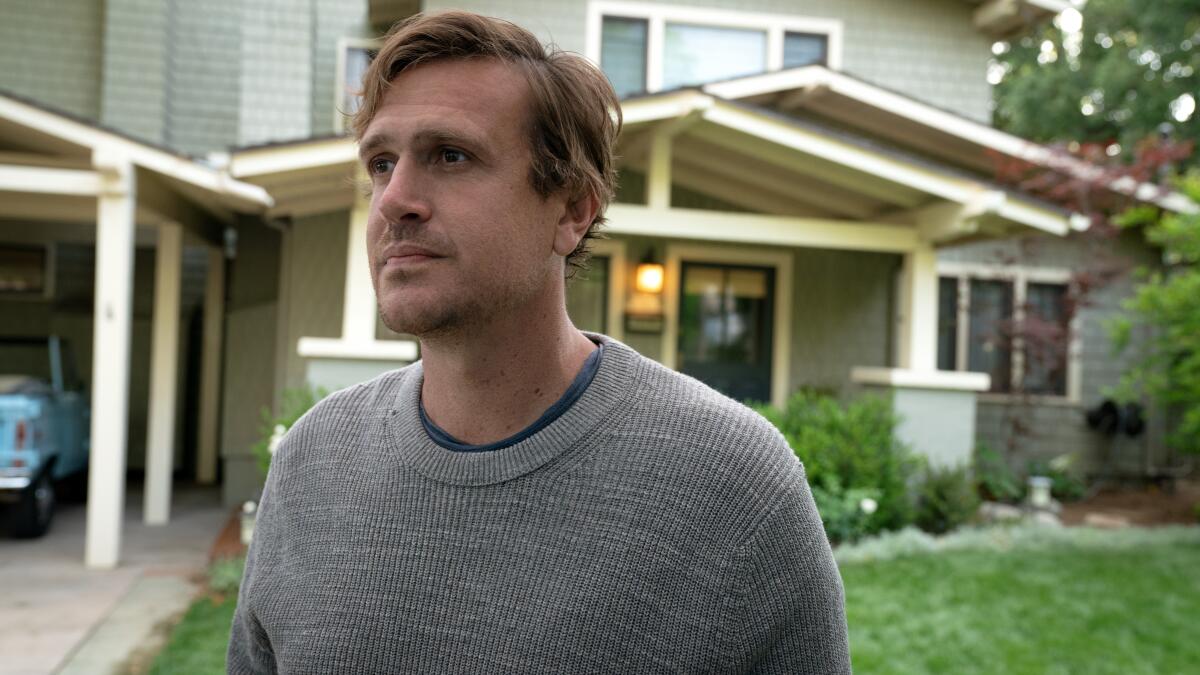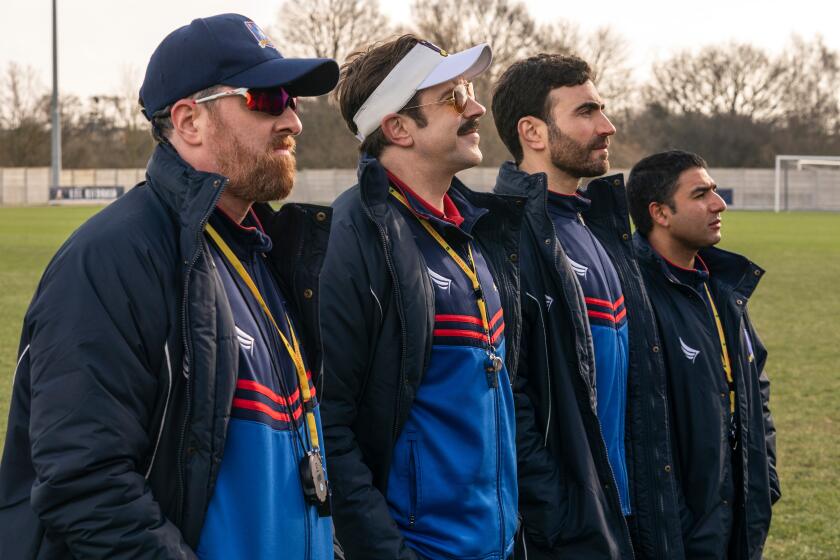Apple’s new comedy is the anti-’Ted Lasso,’ built on a taxingly unlikable protagonist

- Share via
Everything I know about therapy I’ve learned from television, so I can’t say whether the methods in “Shrinking,” premiering Friday on Apple TV+, are any more or less accurate than what I know from “The Bob Newhart Show” or “The Sopranos.” Then again, I don’t know how true “The Sopranos” was to mob life in northern New Jersey. We make allowances.
Jason Segel, a co-creator with “Ted Lasso‘s” Bill Lawrence and Brett Goldstein, stars as Jimmy, a cognitive behavioral therapist, to go by the sign outside the building where he works. He shares offices with his mentor, Paul, played by Harrison Ford, and Gaby, played by Jessica Williams — in that respect, both Jimmy and Segel are lucky men. But whatever good there is in Jimmy’s life has been driven from his mind by the accidental death of his wife a year before, a year he has apparently spent drugging, drinking and inviting young women over for late night swims and who knows what in his semi-posh Pasadena pool — never mind that his alienated teenage daughter, Alice (Lukita Maxwell), is asleep, or not, inside. The hangdog expression he habitually wears he describes as “resting dead wife face.”
Is Jimmy a good therapist? (He quotes Carl Jung, anyway.) It’s hard to tell. If he were a responsible one he’d have taken a sabbatical and sent his clients elsewhere, because if this is how he’s doing after a year, one wonders how he was getting on at three or six or nine months. (To start, he generally looks to have just rolled out of bed, hungover — in a twist beginning, we take him for the patient and not the therapist.)
One day, near the very beginning of the series, having heard the same story too many times from patients unwilling to change, he tells one (“Saturday Night Live’s” Heidi Gardner) to leave her emotionally abusive husband or “I’m done being your therapist.” I say “tell,” but it’s more of a hysterical rant.
Meet the cast, go behind the scenes on key episodes and read our analysis of the inspirational sports comedy that TV fans can’t stop talking about.
When this seems to have some good effect, Jimmy feels as if he’s hit on something, a new, more proactive method. “We aren’t psychological vigilantes,” Paul warns, but Jimmy prefers to wear the mantle proudly: “I think I can help people if I get my hands a little dirtier.” He’s no better at abandoning self-defeating behaviors than are his clients, but that he ought to see a therapist himself is a suggestion no one makes. “I’m normally very good at this,” he claims. But is he?
The narrative proper begins with the arrival of Sean (Luke Tennie), a recently discharged veteran who has been getting into bar fights and has been court-ordered into therapy. When Sean finds himself without a place to live, Jimmy moves him into his pool house, alarming the neighborhood Karen (Sean is Black), briefly discomfiting Alice and dismaying his colleagues for having crashed through an ethical boundary. After some early episodes of acting out, Sean will ironically come to seem the better balanced of the two men — or at least to be putting on the better front.
As an unhappily divorced dad, Ted Lasso was also grieving a lost partner, and as a professional, he was also thinking outside the box. (And therapy was also a Season 2 story line.) But he was an optimist with the ability to see outside himself, and his methods mostly paid off; when they didn’t, it didn’t take him long to to adjust. (That show is is famously “likable.”) Jimmy does make some sort of progress — he reconnects with ghosted best friend Brian (Michael Urie), shows up (late) for a school conference — but he continually backslides, as if the show itself requires that he stays messed up for just a little longer. Which, after all, is how TV works.
The result is at once watchable, owing to the show’s able cast and largely amiable nature, and taxing, due to Jimmy, who makes most any situation about himself. His self-absorption is kind of the point, but it is a point stretched across 10 half-hours — more of a smear than a point. And as written and enacted, his pain isn’t especially moving, nor are his rages especially funny. (Or, for that matter, frightening.) Jimmy overreacts to good news or bad, and one hopes for the sake of his friends and family — not to mention the viewer — that he manages to calm down a little. In the meantime, he overwhelms both his social circle and the series itself.
The complete guide to home viewing
Get Screen Gab for everything about the TV shows and streaming movies everyone’s talking about.
You may occasionally receive promotional content from the Los Angeles Times.
The other characters have minor plot lines of their own, which might have profited from more attention but tend to get lost in the mix. Paul, who meets Alice on a park bench for informal therapy — she pays him in candy because, he says, “You’re poor and I like candy” — has Parkinson’s and some issues with an estranged daughter. Gaby, who is also the best friend of Jimmy’s late wife, is getting divorced; next-door neighbor Liz (Christa Miller) is an empty-nester who has become, to Jimmy’s displeasure, a surrogate mother to Alice, though she would like people to know that she’s also “super cool. ... People want my playlists. I have tiny tattoos.”
Segel is a likable actor in a less likable role (albeit one he has crafted for himself). Ford injects a little bit of Han Solo into his grumpy, dryly sardonic Paul — “Hi, kid” are the first words he speaks to Luke, I mean to Jimmy — and his scenes with Maxwell, as the oldest and youngest cast members, are funny and pleasant, because they actually do seem to be working on something. He has a nice bit with Williams too, singing along to Sugar Ray’s “Every Morning” as she drives him to work, and Williams, who always brightens a screen, has the benefit of playing a character who, while not untroubled, is fairly sane; you’re glad to see her. Tennie, especially once he has moved on from rage, and Maxwell are good company.
Nine out of 10 episodes have been made available for review, and the finale may reveal that this has all been headed somewhere. Not that a big payoff is needed for good television; there’s something to be said for a low-stakes narrative, which is how most of us live most of the time. But “Shrinking,” whose very premise implies high stakes, comes off as both highly earnest and kind of shapeless; even Jimmy’s relationship with Sean falls a little by the wayside. Like Jimmy, it could use some focus.
Cognitive behavioral therapist, heal thyself!
‘Shrinking’
Where: Apple TV+
When: Any time
Rating: TV-MA (may be unsuitable for children under the age of 17 with advisories for violence and coarse language)
More to Read
The complete guide to home viewing
Get Screen Gab for everything about the TV shows and streaming movies everyone’s talking about.
You may occasionally receive promotional content from the Los Angeles Times.








